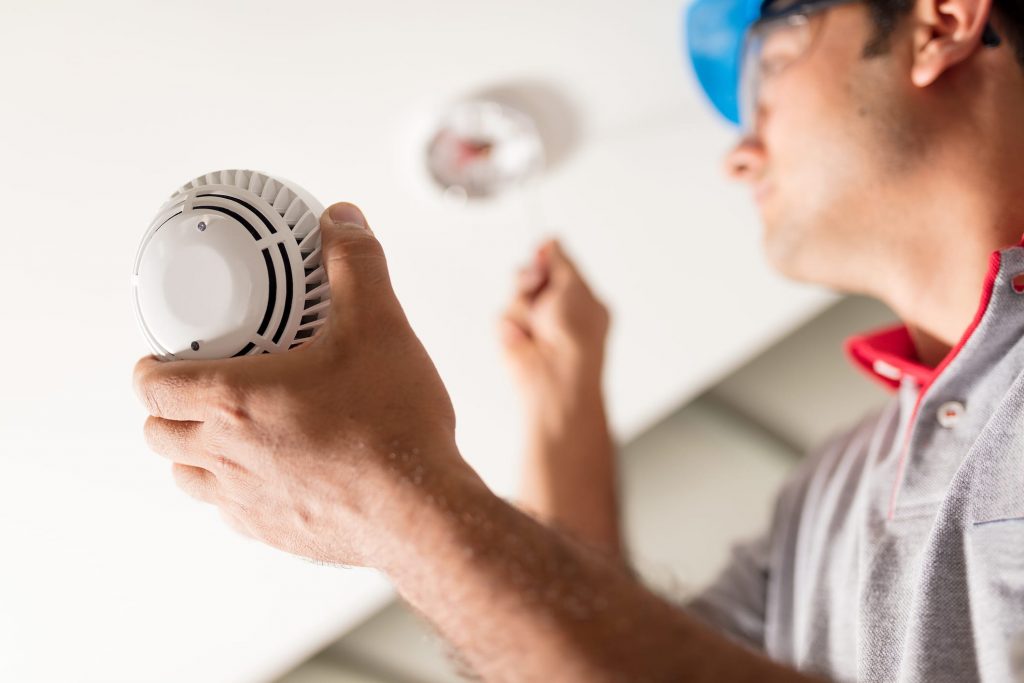How to Choose the Right Smoke Alarm Installation for Your Home: A Complete Guide
A smoke alarm is essential for home safety, providing early fire detection and a crucial time to escape. In the UK, an estimated 27,000+ house fires occurred in 2023, but working smoke alarms double survival chances. Despite this, many homes lack proper alarms or fail to maintain them. UK fire safety laws require Smoke Alarm Installation, especially in rental properties, to prevent fire-related injuries and fatalities. Choosing the right smoke alarm—whether battery-powered, hardwired, or smart—ensures better protection. This guide will help homeowners understand their options and select the best smoke alarm for their needs, ensuring safety and compliance.

Understanding Different Types of Smoke Alarms
Choosing the right smoke alarm starts with understanding the different types available. Each type is designed to detect specific types of fires, making placement and selection crucial for maximum protection.
- Ionisation Smoke Alarms: These alarms are highly sensitive to fast-flaming fires, such as those caused by paper or fabric. They detect tiny smoke particles, making them effective for areas like living rooms and hallways. However, they can be prone to false alarms from cooking fumes or steam.
- Optical (Photoelectric) Smoke Alarms: Designed to detect smouldering fires, these alarms use light sensors to identify smoke particles from slow-burning materials like upholstery or overheated wiring. They are ideal for bedrooms and living areas where slow fires are more common.
- Heat Alarms: Unlike smoke alarms, heat alarms detect temperature changes rather than smoke. They are perfect for kitchens, garages, and laundry rooms, where traditional smoke alarms might be triggered by cooking fumes or dust.
- Combination Alarms: These multi-sensor alarms use both ionisation and optical technology for comprehensive fire detection. They are a great all-around option for general home safety.
Battery-Powered vs Hardwired Smoke Alarms
When selecting a smoke alarm, homeowners must choose between battery-powered and hardwired models. Each has its benefits and drawbacks.
- Battery-Powered Smoke Alarms: These alarms are easy to install and operate independently from the home’s electrical system. They are ideal for homes without pre-installed wiring. However, they require regular battery replacements and can fail if the battery is not maintained.
- Hardwired Smoke Alarms: These alarms are directly connected to the home’s electrical supply, ensuring they always have power. Most also have backup batteries in case of a power outage. They are more reliable but require professional installation. Seeking help from an Electrician Sidcup can ensure proper setup and compliance with safety regulations.
- Sealed Lithium Battery Alarms: These battery-operated alarms come with non-replaceable lithium batteries that last up to 10 years. They eliminate the need for frequent battery changes and provide long-term peace of mind.
Smart Smoke Alarms: Are They Worth It?
Smart smoke alarms offer advanced fire protection with internet connectivity and real-time alerts.
- How They Work: Smart smoke alarms detect fire threats and send notifications to your smartphone, even when you’re away from home.
- Remote Alerts & Security Integration: These alarms integrate with home security systems, enabling remote monitoring and immediate alerts.
- Best Smart Alarms in the UK: Popular models like Nest Protect and Kidde 10SCO offer features such as voice alerts, carbon monoxide detection, and self-testing functionality.
Placement and Number of Smoke Alarms
Proper placement is crucial for effective fire detection.
- Recommended Locations: Install alarms in hallways, bedrooms, and living areas. Avoid placing them near vents, windows, or kitchens unless using a heat alarm.
- Number of Alarms: UK fire safety regulations recommend at least one alarm per floor and in key areas where fires are likely to start.
- Common Mistakes: Avoid installing alarms too close to kitchens, bathrooms, or heaters, as steam and fumes can trigger false alarms.
Smoke Alarm Features to Consider
Modern smoke alarms offer several features that enhance safety and functionality:
- Interconnectivity: Enables multiple alarms to communicate with each other, ensuring the entire home is alerted to a fire.
- Escape Light Feature: Provides illumination in the event of a fire to help guide occupants to safety.
- Hush Button: Allows temporary silencing of alarms triggered by cooking smoke or steam.
- End-of-Life Indicator: Alerts homeowners when the alarm needs to be replaced, ensuring continued protection.
UK Fire Safety Regulations for Smoke Alarms
Understanding UK fire safety laws is essential for compliance and home safety.
- Legal Requirements: Homes must have at least one smoke alarm per floor, and landlords are required to ensure alarms are installed and functional.
- Landlord Obligations: Private rental properties must have working smoke alarms on each storey and carbon monoxide alarms in rooms with solid fuel appliances.
- BS 5839-6:2019 Compliance: This British Standard provides guidance on the installation, maintenance, and testing of smoke alarms in different types of properties.

How to Install and Maintain Your Smoke Alarm
Proper installation and maintenance ensure optimal performance of smoke alarms.
- Installation Guide: Install alarms on ceilings, away from walls and corners. Follow manufacturer guidelines and avoid placing alarms too close to air vents or fans. If unsure, consult an electrician Sidcup, for professional installation.
- Testing & Maintenance: Test alarms monthly, clean them regularly to remove dust, and replace batteries as needed.
- Replacement Timeline: Most smoke alarms need replacing every 10 years. If an alarm chirps continuously, it may need a battery change or full replacement.
Choosing the right smoke alarm is crucial for home safety. Regular testing and maintenance ensure it functions effectively, while professional installation guarantees proper placement and compliance with UK regulations. Seeking assistance from an electrician Sidcup can ensure safe and reliable Smoke Alarm Installation. Investing in a reliable smoke alarm can save lives and provide peace of mind.
